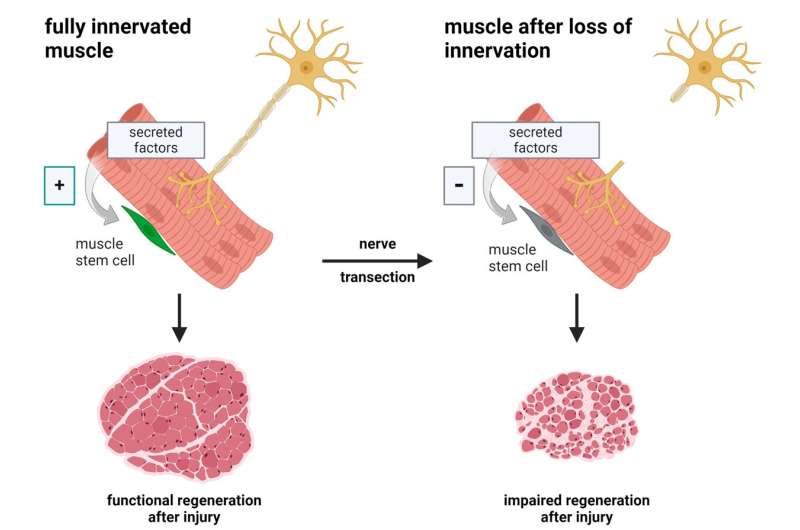This article has been reviewed according to Science X's editorial process and policies. Editors have highlighted the following attributes while ensuring the content's credibility:
fact-checked
peer-reviewed publication
proofread
New insights into muscle health: How innervation influences the recovery process

Researchers from Leibniz Institute on Aging—Fritz Lipmann Institute (FLI) in Jena and BTU (Cottbus) have identified the cause of changes in the behavior of muscle stem cells. The insights are the basis for more effective treatment of injuries and muscle diseases in the future, especially in the elderly.
The functionality of our muscles and their repair process are closely linked to innervation. But what happens when these connections are disrupted? A research team led by Julia von Maltzahn, Professor of Stem Cell Biology of Aging at Brandenburg University of Technology Cottbus-Senftenberg (BTU) and former research group leader at the Leibniz Institute on Aging—Fritz Lipmann Institute Jena (FLI), has now demonstrated that such interruptions in innervation not only significantly impact muscle functionality but also their regenerative capacity. The findings are published in npj Regenerative Medicine.
The investigations have shown that interruption of innervation of muscles primarily causes alterations in muscle fibers, which are an important component of the niche of muscle stem cells. Loss of innervations alters the composition of signaling molecules released by muscle fibers, thereby impairing the functionality of stem cells in skeletal muscle.
Since muscle stem cells are essential for regeneration after injury, disruption of muscle stem cells leads to reduced repair of damaged muscles. Furthermore, the research team led by Julia von Maltzahn documented that loss of innervation also influences the integrity of muscle fibers themselves.
The lead author, Henriette Henze, said, "Initially, the muscle fibers change in architecture and behavior, causing them to emit certain substances that, in turn, affect the properties and thus the activity of stem cells."
While a connection between nerve injuries and impaired muscle regeneration was known in the scientific community, the cause of the changes in the behavior of muscle stem cells has now been identified after five years of meticulous research. This paves the way for further approaches.
"Our results are also applicable to other organ systems consisting of various cell types. It is important to analyze the overall structure of the tissue to understand the causes of changes in regenerative capacity," says Julia von Maltzahn.
It remains to be investigated which molecules exactly lead to these behavioral changes in stem cells and how this could be prevented. The insights gained now are thus the basis for more effective treatment of injuries and muscle diseases in the future, especially in the elderly.
More information: Henriette Henze et al, Denervation alters the secretome of myofibers and thereby affects muscle stem cell lineage progression and functionality, npj Regenerative Medicine (2024). DOI: 10.1038/s41536-024-00353-3





















